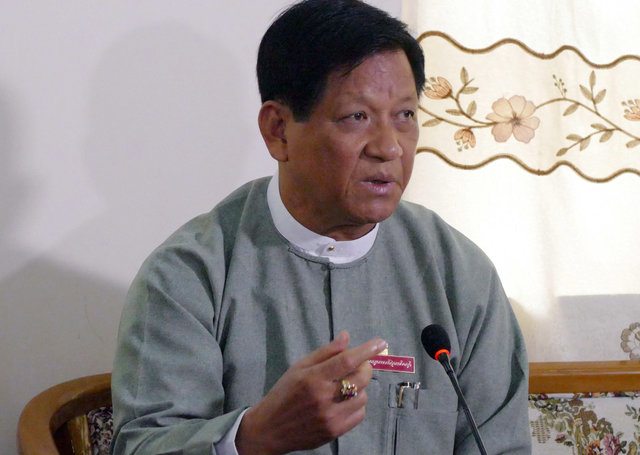Burma’s general election lies in limbo after a meeting today between the Union Election Commission (UEC) and representatives of the major political parties was adjourned without a decision on whether to postpone the polls.
UEC Chairman Tin Aye had proposed postponing the 8 November election due to recent flooding and landslides across the country.
Of the 10 parties invited to Tuesday’s crucial meeting, seven attended: the ruling Union Solidarity and Development Party (USDP); Aung San Suu Kyi’s National League for Democracy (NLD); National Development Party (NDP); Myanmar Farmers Development Party (MFDP); Arakan National Party (ANP); National Democratic Force (NDF); and National Unity Party (NUP).
Three parties – USDP, NDP and MFDP – voiced support for a postponement of nationwide polling, while only the main opposition party, NLD, objected. The ANP, NDF and NUP abstained.
Speaking to DVB from Naypyidaw after the meeting, NLD central executive committee member Win Htein said the UEC had not informed the party representatives in advance of the agenda for today’s talks.
“U Tin Aye expressed a wish to postpone the elections citing landslide and flood disasters in places such as Kawlin and Hpakant,” said Win Htein.
“We called for a discussion on the proposal,” he continued. “The USDP, NDP and MFDP voiced their support to the UEC chairman. The NUP, ANP and NDF abstained, asserting that the decision belonged to the UEC chairman.
“However, I objected, stressing that the government went ahead with the national referendum in 2008 despite a catastrophic cyclone disaster that left Irrawaddy and Rangoon divisions in shambles. Therefore, I said, the reason provided by [U Tin Aye] was insufficient.”
[related]
Following the meeting, the election commission chairman told reporters that a final decision on whether to postpone the elections would be announced later on Tuesday or on Wednesday.
Also at the meeting was Aye Nu Sein, the deputy-chair of the ANP. He said, “We neither supported nor objected to the proposal, but voiced our opinion on the possibilities at hand. We accept that there has been natural disasters and armed conflict, but if the elections are to be postponed they should be postponed nationwide. We do not agree with closing polling stations in certain areas but not others. This will only prolong disagreements between parties and fuel more problems.”
A day earlier, the election commission had announced that voting could not take place in several sensitive areas due to ongoing security concerns and a lack of guarantees that polling could be carried out in a free and fair manner.
These areas include: 212 village-tracts in Kachin State; 94 village-tracts in Karen State; 41 in Pegu division; one in Mon State; and five townships and 56 village- tracts in Shan State.
By law, the election must be held 30 to 90 days ahead of the next parliamentary session, which is scheduled to open on 30 January 2016.



